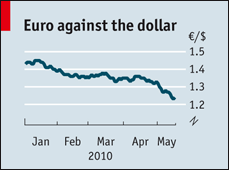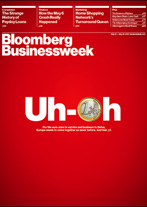
~~~
- The Economist – The euro-zone crisis: Europe’s three great delusions
The continent’s leaders have still not grasped how much they need to do to save the euro
The first is shoot-the-messenger syndrome. Too many European politicians lay all the blame on speculators, hedge funds, rating agencies and the rest for “unwarranted” attacks on the euro. Such thinking has informed Germany’s decision to ban “naked” short-selling of government bonds. The German regulator itself admits that this practice played little part in the Greek mess. The ban will apply only in Germany, whereas most short-selling happens in London. If it has any impact at all, it will merely make it harder to sell government bonds.
The second delusion might be termed excessive faith in shock-and-awe. … In truth, Greece’s debt problem is one of insolvency, not illiquidity—and insolvency cannot be rectified by piling on more debt, however shocking and awesome the amount. Instead, euro-zone governments and regulators should start planning now for an orderly debt restructuring, including the imposition of losses (“haircuts”) on banks that hold Greek debt.
The third and most disturbing delusion is that deeper structural reform is not necessary; everything will be fine if only Greece and other euro-zone laggards cut their budget deficits. Several notorious fiscal reprobates are promising Angela Merkel that they will whip themselves into line. This is both masochistic and cowardly.
Comment
There is a misguided belief that yet another bailout package will be announced this weekend and this one will finally solve the crisis. There is already a $1 trillion bailout in place, larger than the TARP. This was the sixth emergency bailout announced this spring and the largest. Each one was designed to “wow” the markets after the previous one was deemed inadequate.
This kind of thinking misses the point of the problem of the crisis. See the highlighted part above. This is a solvency crisis. Letting Greece or other PIIGS countries borrow more money is not the answer. Greece has already been bailed out and does not need to borrow from the capital markets until 2013 (they will get their loans from other Euro-zone countries directly). So, the Greeks are already “covered” as part of the 750 billion euro deal announced two weeks ago.
The problem is the market is not buying this “fix too much debt with more debt” approach. More bailouts are not the answer. Austerity is the answer.
~~~
- BusinessWeek – Come Together
The euro zone’s crisis can only be solved by unity, says ECB President Jean-Claude Trichet. So why is everyone talking about blowing it up?
Anyone trying to predict the outcome of Europe’s financial crisis should pay close attention to Jean-Claude Trichet. As head of the Bank of France in 1999, he helped create the euro. After seven years babysitting the new specie as president of the European Central Bank in Frankfurt, Trichet and the euro are as intertwined as a man and a currency can be. He is too invested to let it break apart on his watch. Whatever emotional tug the 67-year-old Trichet may feel, though, is counterbalanced by his devotion to sound money and central bank independence. He doesn’t want to debase the euro just to keep shakier members of the zone on board. Even as the financial crisis spiraled out of control, he refused to support weak governments—Greece, Spain, Portugal—by buying up their debt. That restraint burst on May 10. A run on Greek government bonds had begun to spill over into Portuguese, Spanish, and even Italian sovereign debt, raising fears of a self-feeding downward spiral. That day, Trichet reversed course and announced the ECB would begin buying sovereign bonds after all, “to ensure depth and liquidity.” That, along with a 750-billion-euro loan package from EU countries, stopped the run and gave the euro some breathing room. - The Wall Street Journal – Falling Euro Spurs Cautious Intervention Talk
Officials in the U.S. and Europe concerned about the euro’s decline are cautiously talking about a policy tool they haven’t used in a decade: intervening in currency markets. Policy makers have been content to let markets set the value of the euro, which has fallen about 17% since early December, worrying U.S. exporters who face European competition and raising fear of inflation in Germany. Expectations of the prospects of intervention pushed up the euro to near $1.26, after the currency had slipped below $1.23 earlier. Late in the day, the euro traded at around $1.25. Marco Annunziata, chief economist at UniCredit in London, figures the euro would have to fall to about $1.10 in a week or so to prompt policy makers to act. Such a fall could shake markets globally, boost interest rates in Europe, and threaten to undermine a global recovery. - The Telegraph (UK) – Whatever Germany does, the euro as we know it is dead
Angela Merkel’s ban on short-selling is just a distraction from the horror to come
For Angela Merkel, leader of the eurozone’s richest country, a queue is forming of high-quality adversaries. As she tips German Geld und Gut into the furnace of a rescue package for the euro, while going it alone in a misguided ban on market “manipulators”, the brass-neck Chancellor has infuriated domestic voters, angered her EU partners (in particular the French) and invited the so-called wolf pack of global traders to do its worst. In one respect, Mrs Merkel is right: “The euro is in danger… if the euro fails, then Europe fails.” What she has not yet admitted publicly is that the main cause of the single currency’s peril appears beyond her control and therefore her impetuous response to its crisis of confidence is doomed to fail. The euro has many flaws, but its weakest link is Greece, whose fundamental problem is that for years it spent too much, earned too little and plugged the gap by borrowing in order to enjoy a rich man’s lifestyle. It flouted EU rules on the limits to budget deficits; its national accounts were a moussaka of minced statistics, topped with a cheesy sauce of jiggery-pokery. - The Wall Street Journal – Editorial: The Fear Returns
Europe’s policy panic is feeding another financial panic.
Anyone who thought that last week’s IMF-EU bailout would calm markets has had a rude awakening this week, especially after yesterday’s global selloff in stocks. It rarely gets uglier than a 3.6% one-day fall in the Dow and 4.1% on the Nasdaq. Even more ominous is the return of fear in the credit markets, with interbank risk spreads hitting their widest levels since spring 2009. Investors are fleeing riskier assets and moving back to the relative safety of the dollar and U.S. Treasurys, which means less credit available to finance business and risk-taking. The plunge of the euro has exacerbated this flight to the greenback, and the rapid exchange-rate movements of recent weeks are always more disruptive to investment decisions and capital flows than conventional economic wisdom cares to admit. Feeding the financial panic is the policy panic, especially in Europe. Instead of keeping cool, political leaders are restricting short sales, banning hedge funds, and proposing to raise taxes on any euro that moves somewhere that politicians don’t like. All of this only speeds the flight out of euro assets. German Finance Minister Wolfgang Schäuble should try not speaking for a day, and see if the euro rises.



What's been said:
Discussions found on the web: